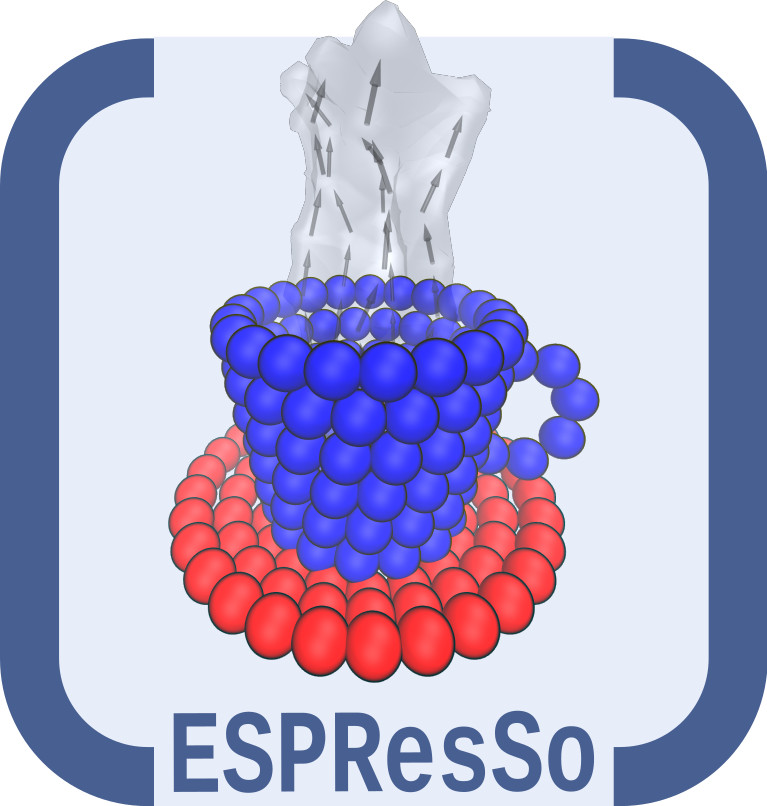Systematic coarse-graining and machine learning in soft matter physics with ESPResSo
Location: CECAM-DE-SMSM, Institute for Computational Physics, University of Stuttgart, Stuttgart
Organisers
Invited speakers
- Philip Loche (EPFL, Switzerland)
- Denis Andrienko (Max Planck Institute for Polymer Research, Germany)
- Christoph Junghans (Los Alamos National Laboratory, United States)
- Simon Olsson (Chalmers University of Technology, Sweden)
- Julija Zavadlav (Technical University of Munich, Germany)
- Nico van der Vegt (Technical University of Darmstadt, Germany)
- Markus Miettinen (University of Bergen, Norway)
- Deniz Mostarac (University of Edinburgh, Scotland)
- Samuel Tovey (University of Stuttgart, Germany)
Please note: due to unforeseen circumstances, speaker Christoph Junghans (Los Alamos National Laboratory, United States) won't be able to join this event. We apologize for the inconvenience.
Course description
Scientific content
This school will teach coarse-graining [10], reverse coarse-graining, chemical space exploration [11], machine learning descriptors, machine-learned effective potentials, reinforcement learning, soft matter physics, and lattice-Boltzmann hydrodynamics[12].
Lectures will provide an introduction to the physics and model building of these systems as well as an overview of the necessary simulation algorithms. During the afternoon, participants will practice running their own simulations in tutored hands-on sessions using the software ESPResSo[1]. Many of the lectures and hands-on sessions will be taught by developers of the software. Hence, the school will also provide a platform for discussion between developers and users about the future of the software used in the hands-on sessions. Moreover, users can get advice on their specific simulation projects. Time will also be dedicated to research talks, which illustrate how the simulation models and software are applied, and which provide further background on simulating soft matter at different length and time scales.
Poster session
Call for abstracts: you can submit a poster abstract until September 26, 2025.
You have the opportunity to bring a poster to introduce your work to your peers. We welcome abstract submissions on both planned and ongoing research projects, done with or without ESPResSo, as long as they fit to the general themes of this event. The abstract should contain at most 400 words without counting the bibliography, and not have been published elsewhere.
Everyone bringing a poster is invited to present it in a 1 minute lightning talk during the poster session. The poster boards will remain up for the entire duration of the school. The recommended poster layout is DIN A0 in portrait orientation; smaller sizes are possible in both portrait and landscape orientation, as long as the width doesn't exceed 900mm.
Accepted contributions have been published in a book of abstracts under a permissive open-source license (doi:10.5281/zenodo.17362577).
Teaching material
Hands-on sessions
We use interactive Jupyter notebooks to teach concrete applications of the simulation methods introduced in the lectures. These notebooks outline physical systems relevant to soft matter physics and sketch simulation scripts written for ESPResSo using the Python language. A few parts of these scripts are hidden and need to be completed by participants, with the help of the ESPResSo user guide and the tutors.
These exercises can also be carried out in self-study after the school via the online platforms Binder and Gitpod, and all exercises have hidden solutions that can be revealed at any time.
Software
In this school, participants learn to conduct and link simulations at different scales by means of systematic coarse-graining and machine learning. The focus will be on coarse-grained models from the broad fields of statistical physics, soft matter and active matter, using the software ESPResSo (espressomd.org). ESPResSo is an open-source particle-based simulation package with a focus on coarse-grained molecular dynamics models. In addition, it offers a wide range of schemes for solving electrostatics, magnetostatics, hydrodynamics and electrokinetics, as well as algorithms for active matter and chemical reactions[1,4]. These methods can be combined to simulate different scales and recover emergent material properties at macroscopic scales. In addition, we can couple ESPResSo to external software to offload calculation of forces using machine-learned potentials, or carry out reinforcement learning to control smart agents in active matter simulations.
ESPResSo consists of an MPI-parallelized simulation core written in C++ and a scripting interface in Python which integrates well with scientific Python packages, such as NumPy, pyMBE[5], pyOIF[6], VOTCA[7], ZnDraw[8] and SwarmRL[9]. ESPResSo relies on waLBerla, a high performance lattice-Boltzmann library, for hydrodynamics and other lattice-based schemes for electrokinetics and related fields[2]. Custom waLBerla kernels can be rapidly prototyped in symbolic form in Python and automatically converted to highly optimized, performance-portable code for CPUs and GPUs[3].
Event organization
This school is planned as an on-site event.
Hands-on sessions will be tutored by experienced ESPResSo users and developers. There will be additional opportunities for scientific exchange during the event: scientific speed dating and BBQ on Monday, poster session on Tuesday, city tour and conference dinner on Thursday.
A preliminary schedule is available as a PDF file in the Documents tab. A more detailed version will be made available in the summer, once all speakers have confirmed their time slots. The school starts on Monday at 9am and ends on Friday at 1pm.
Applying for this school
This event doesn't charge a participation fee.
When applying, be sure to provide a motivation and a CV, as we will use that information to select participants.
Travel plans and accommodation
We recommend that you look for a hotel well in advance. Hotels in the area will be in high demand since a fair is organized at the same time as this school. The International Student Hotel has affordable prices for students, and we have blocked a small number of rooms in that hotel until August 1, 2025. Once your participation is accepted, you can request us one room if we still have any left, and we will provide you with the information necessary for you to initiate the booking. You can also book a room directly with them via their website. Please be aware that booking a room through us doesn't change the price per night compared to a direct booking. We the organizers won't ask you for your credit card information, and we won't forward your personal information to a third-party without seeking your consent first.
We will be happy to provide you with a formal invitation letter for a Visa application. Simply mention it in your application.
Prerequisites and content levels
We welcome participants at any stage of their academic or professional career. This school teaches advanced concepts in soft matter physics that build upon natural sciences knowledge introduced at the undergraduate level. Familiarity with the Python programming language is required for hands-on sessions.
Contents:
- 12 hours of lectures (basic: 3 hours, intermediate: 5 hours, advanced: 4 hours)
- 9 hours of hands-on sessions (basic: 3 hours, intermediate: 3 hours, advanced: 3 hours)
- 4 hours of scientific talks
Books of abstracts and recorded lectures from past iterations of the school are available online with links in the "Documents" tab. If you have questions about the event, feel free to contact the organizers at espresso{at}icp.uni-stuttgart.de.
Acknowledgements
This event is made possible thanks to the support from the ESPResSo MD organization, CECAM, the ICP, the German Research Foundation, MultiXscale, and the German Federal Ministry of Education and Research.
References
Tristan Bereau (Heidelberg University) - Organiser & speaker
Jean-Noël Grad (University of Stuttgart) - Organiser & speaker
Christian Holm (University of Stuttgart) - Organiser & speaker
Alexander Schlaich (Hamburg University of Technology) - Organiser & speaker
Rudolf Weeber (University of Stuttgart, Institute for Computational Physics) - Organiser & speaker

 About
About






